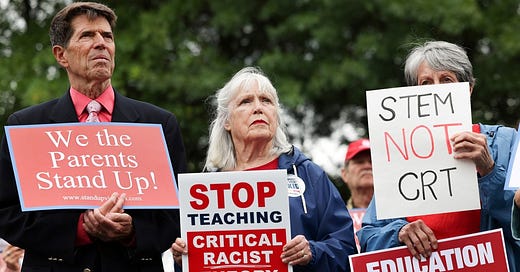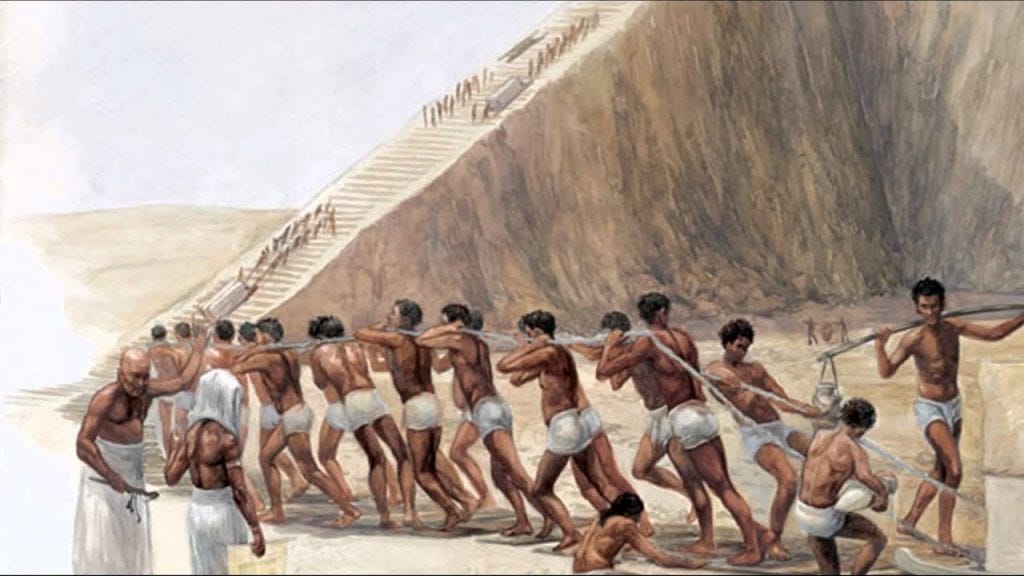Here is how the title question comes up. Lately, some parents and political commentators in America have been complaining that grade school kids are being taught “Critical Race Theory”. This may be a misuse of the term “critical race theory”, but that's not important. The actual criticism is that kids are being given lessons that are racist (against whites) and anti-American. When they’re not busy caviling about the use of the phrase “CRT”, the left say that the schools are not teaching racism or anti-Americanism but are simply teaching accurate history. A lot of bad stuff in fact happened in America’s history, such as slavery, Jim Crow, dispossession of the Native Americans, etc. You don’t object to teaching the truth, do you? You’re not for lying or covering up our history, are you?
Hence, my question: Is there a way in which it could be racist or otherwise objectionable to teach actual historical facts?
And it seems to me the answer is obviously yes.
It’s a simple point. Suppose you learned that there was a school staffed mainly by right-leaning teachers and administrators. And at this school, an oddly large number of lessons touch upon, or perhaps center on, bad things that have been done by Jews throughout history. None of the lessons are factually false – all the incidents related are things that genuinely happened and all were actually done by Jewish people. For example, murders that Jews committed, times when Jews started wars, times when Jews robbed or exploited people. (I assume that you know that it’s possible to fill up quite a lot of lessons with bad things done by members of whatever ethnic group you pick.) The lessons for some reason omit or downplay good things done by Jews, and omit bad things done by other (non-Jewish) people. What would you think about this school?
I hope you agree with me that this is a story of a blatantly racist and shitty school. It would be fair to describe the school as promoting hatred toward Jewish people, even if none of the lessons explicitly stated that one should hate Jews. I hope you also agree that no parent or voter should tolerate a public school that operated like this.
Now, what if the school’s right-wing defenders explained that there was actually nothing the slightest bit racist or otherwise objectionable about the school, because it was only teaching facts of history? All these things happened. You don’t want to lie or cover up the history, do you?
I hope you agree with me that this would be a pathetic defense.
So if you agree about that, now you understand how non-woke people (the vast majority of people) would see the parallel argument about the actual schools in present-day America when a large number of lessons involve bad things about America and/or white people.
Objections
But, you say, surely that case is different! How is it different?
Maybe it’s different because …
(1) “White people/Americans have done so much more bad stuff than other groups.”
Of course that’s false. Just to take one major injustice, slavery was widely practiced in human societies throughout history, going back at least to the very first civilizations (ancient Sumeria, ancient Egypt, etc.). Recall that in ancient Rome, they used to force slaves to fight to the death for entertainment. Slavery was widely practiced in Africa for centuries before Arabs or Europeans showed up to export slaves from there. In Africa in the 19th century, some societies were half composed of slaves. (https://en.wikipedia.org/wiki/History_of_slavery)
Notice that I’m not saying that this means American slavery was cool. You can tell I’m not saying that because I’m not a moron. I’m saying that you can’t explain the focus on American injustices in our schools by saying that there are more such injustices or that they were worse than non-American injustices. It’s more plausible to explain the focus in terms of hatred for America – just as you would explain the focus on wrongs committed by Jews in my above story by the hypothesis that the people running that school hate Jews.
(2) “Whites are the majority/in power in America, and you can’t be ‘racist’ against a dominant group.”
I find this a silly word game that wouldn’t fool anyone. First of all, no, there’s nothing about the meaning of “racist” in English that implies that it can’t be applied to hatred against white people.
Second, if there was, we could just define a term “racism*” which is just like “racism” except that it applies to hatred for any race.
Third, regardless of what label you apply to it, it is extremely implausible to think it’s fine to teach kids to hate some social group as long as that group has power.
(3) “Evils committed by America/white people are more important for Americans/white people to know about.”
First, if it’s important for white Americans to learn about wrongs committed by white Americans, wouldn’t it be similarly important for blacks to learn about wrongs committed by blacks, for Jews to learn about wrongs committed by Jews, etc.? And so shouldn’t our schools be teaching those things?
Second, why wouldn’t it be equally important for whites/Americans to learn about what is good about whites/America? By learning about bad things, we can make sure that we remedy them. But also, by learning about good things, we can make sure that we preserve them. Also, from the standpoint of promoting national cohesion and loyalty, teaching about the good is much more important than teaching about the bad.
Third, just from the standpoint of intellectual understanding, wouldn’t it be important to get an accurate picture of how America/white people compare to other nations/races? And so wouldn’t we also need to teach about bad aspects of other nations and races?
(4) “But white racism explains so much about present-day society.”
First, note that that is a highly controversial, ideological position. Extreme ideologues often refuse to recognize their ideological beliefs as such, even when it’s totally obvious to everyone else. Maybe they think, “This belief is correct, so it can’t be ideology.” No, that’s wrong (and it’s also just what an ideologue would say). Here is a better test: Ask if you think a typical Republican voter (which, as you know, would be nearly half of all voters) would agree that white racism explains an enormous amount about present-day society. If you’re not completely delusional, you’ll recognize that the answer is no. Obviously no. That’s a pretty good indication that the statement is ideologically controversial.
Now, you might say, “We should still teach it if it’s an objective fact.” But, to the extent that there is anything to the distinction between fact and opinion, this one is just obviously an opinion, not an objective fact. You can hypothesize that racism explains this or that; you can’t observe that this is true, nor has this been scientifically proven. It’s obviously a point of political ideology.
(Compare: I’m a libertarian anarchist. I think that view is correct. But I’m not so goddamned blinkered that I don’t know that this is my ideology. I don’t think teaching libertarianism is just like teaching chemistry or calculus.)
Now, maybe you just think it’s fine to lobby for schools to teach controversial political views, as long as they are the right political views. I think this is problematic if the schools in question are public and therefore people of different ideologies are being forced to support them. (This objection goes away if you privatize the schools.)
Be that as it may, I at least want everyone to understand how those ordinary parents who are objecting to “CRT” feel, and that their objections are rational and not reasonably addressed by the above sort of claims. You can’t reasonably expect any person who isn’t already on your side to be the slightest bit moved by your appeal to a big, controversial point of left-wing ideology. So to the extent that this is how people defend American grade school education, we should all expect that defense to completely fall flat. It’s analogous to the people defending my hypothetical anti-Semitic school saying, “Oh, but Jewish greed explains so much about present-day society.”
On a larger note, political partisans really need to learn how to argue. Don’t argue by presupposing super-controversial points of your ideology that no one outside that ideology agrees with. That doesn’t accomplish anything.




